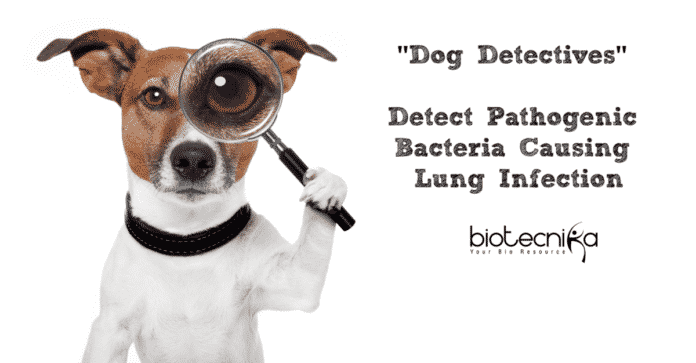Dog Detectives detect the pathogenic bacteria that cause lung infections in Cystic Fibrosis (CF) patients. These Sniffer Dogs are specially trained to detect ultra-low concentrations of these pathogens.
Bacterial infections are a major cause of lung damage in people with cystic fibrosis (CF) patients. Pseudomonas aeruginosa is one of the pathogens that is involved in causing infection, chronically infecting around 60% of around 10,000 CF patients in the UK.
In a study by Imperial College London and the charity Medical Detection Dogs, scientists found that specially trained medical detection dogs were able to detect ultra-low concentrations of the pathogen Pseudomonas aeruginosa (Pa), which is the most common cause of lung infection in people with Cystic Fibrosis.
This finding was published in the European Respiratory Journal. It reveals that these Dog Detectives were able to differentiate between Pseudomonas aeruginosa and other pathogens.
Researchers consider these trained dogs to be more sensitive and affordable at the same time when compared to the existing technologies for screening lower airway infections in CF patients.
Professor Jane Davies, from the National Heart and Lung Institute at Imperial College London, said that it is challenging to develop advanced technology to detect respiratory infections. Training of these dogs was done
on cultured samples. This would now serve as a foundation for testing patients samples directly. He termed this as an ‘exciting development’.
Professor Davies further explained that these Dog Detectives that detect pathogenic bacteria had a positive impact on patients as they can now send samples from their home for its processing by these Dog Detectives. These dogs were trained to recognize cultured liquid samples containing Pseudomonas aeruginosa. Whenever they gave positive indication while sniffing samples, they were rewarded. They were further trained by giving them a variety of samples. These included samples included either Pa, other cultured bacteria, or sterile liquid in a random sequence.
The team of scientists measured the sensitivity and specificity of the animals—where sensitivity is how accurately they correctly identify the presence of Pseudomonas aeruginosa, and specificity is to what degree of accuracy they can rule it out in a sample.
In trials with samples of Pseudomonas aeruginosa versus other bacteria familiar to the dogs, a mean sensitivity of 94.2% and a specificity of 98.5% was recorded. But when the dogs came up against Pseudomonas aeruginosa versus previously unencountered bacteria, two of the animals maintained average sensitivity above 90%. When it came to the detection of heavily diluted samples of Pseudomonas aeruginosa as well as samples that were mixed with other pathogens, the dog detectives had a sensitivity of more than 93% and 86%, respectively.
Dr. Claire Guest, Chief Executive and co-founder of Medical Detection Dogs, said that this was one of the first studies carried out in the world and its findings will have a remarkable contribution to saving human lives.
The infection caused by Pseudomonas aeruginosa can be successfully treated with the proper administering of appropriate antibiotics, but frequently reoccurs and in later stages, they acquire antibiotic resistance. Chronic Pseudomonas aeruginosa is closely linked with faster lung function decline and earlier mortality.
In children, the root cause of infection may often be harder to diagnose and once it takes hold of the lungs it becomes extremely difficult to cure the infection. These patients may typically be prescribed broad-spectrum antibiotics which may have a limited effect on Pseudomonas aeruginosa. Early detection of the cause which generally goes unnoticed, could lead to prescribing more targeted antibiotics.
Dr. Guest added, that In the UK thousands of cases were reported on Pseudomonas infection. He further said that these Dog Detectives that detect Pathogenic bacteria would definitely help tackle this situation.
Dr. Janet Allen, Director of Strategic Innovation at the Cystic Fibrosis Trust, said this quick and easy way to detect Pseudomonas would make a massive difference to people with cystic fibrosis and their families. He said that scientists are working on advancing this project so that patients with cystic fibrosis can live longer and healthier lives.






























